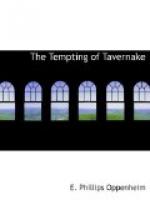“And afterwards?” she whispered.
He was attending to her no longer. They were turning now into the broad thoroughfare at the bottom of the lane, at the end of which a tram-car was waiting. He scribbled a few, final notes into his pocket-book.
“To-morrow,” he exclaimed, with the joy of battle in his tone, “to-morrow the fight begins in earnest!”
Beatrice passed her hand through his arm.
“Not only for you, dear friend, but for me,” she said. “For you? What do you mean?” he asked quickly.
“I have been trying to tell you all day,” she continued, “but you have been too engrossed. Yesterday afternoon I went to see Mr. Grier at the Atlas Theatre. I had my voice tried, and to-morrow night I am going to take a small part in the new musical comedy.”
Tavernake stared at her in something like consternation. His ideas as to the stage and all that belonged to it were of a primitive order. Mrs. Fitzgerald was perhaps as near as possible to his idea of the type. He glanced incredulously at Beatrice — slim, quietly dressed, yet with the unmistakable, to him mysterious, distinction of breeding.
“You an actress!” he exclaimed.
She laughed softly.
“Dear Leonard,” she said, “this is going to be a part of your education. To-morrow night you shall come to the theatre and wait for me at the stage-door.”
CHAPTER XI
A BEWILDERING OFFER
Elizabeth stood with her hands behind her back, leaning slightly against the writing-table. The professor, with his broad-brimmed hat clinched in his fingers, walked restlessly up and down the little room. The discussion had not been altogether a pleasant one. Elizabeth was composed but serious, her father nervous and excited.
“You are mad, Elizabeth!” he declared. “Is it that you do not understand, or will not? I tell you that we must go.”
She shrugged her shoulders.
“Where would you drag me to?” she asked. “We certainly can’t go back to New York.”
He turned fiercely upon her.
“Whose fault is it that we can’t?” he demanded. “If it weren’t for you and your confounded schemes, I could be walking down Broadway next week. God’s own city it is, too!” he muttered. “I wish we’d never seen those two young men.”
“It was a pity, perhaps,” she admitted, “yet we had to do something. We were absolutely stonybroke, as they say over here.”
“Anyway, we’ve got to get out of this,” the professor declared.
“My dear father,” she replied, “I will agree that if a new city or a new world could arise from the bottom of the
Once more he struck the table. Then he threw out his hands above his head with the melodramatic instinct which had always been strong in his blood.




